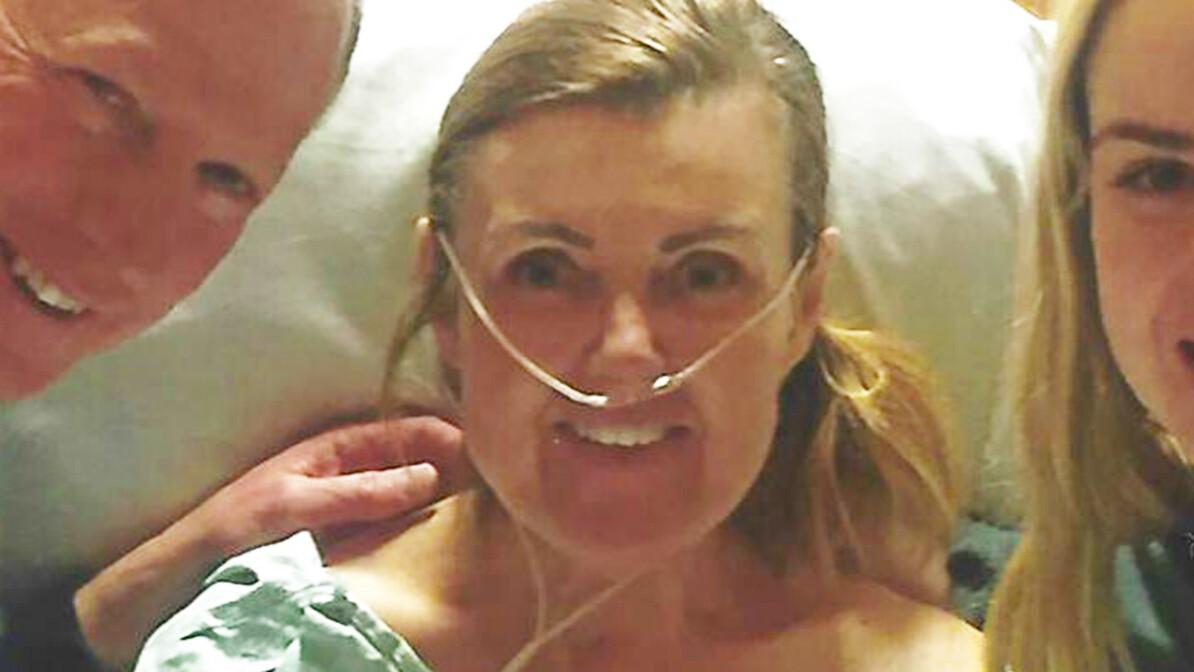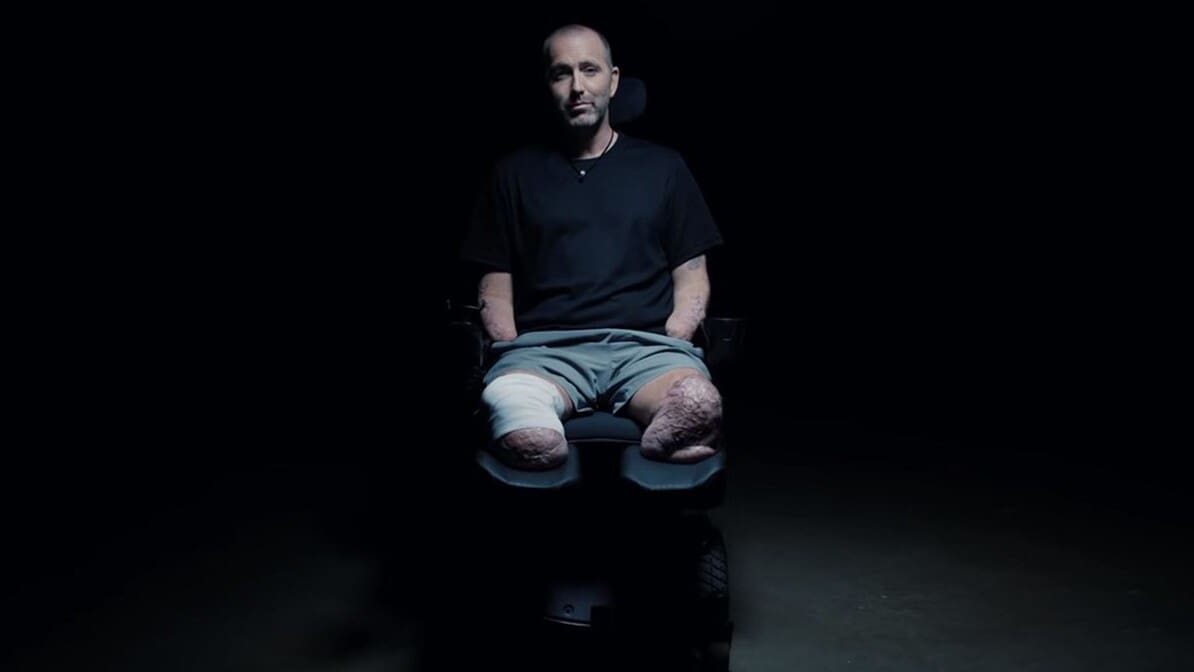
Shameless Persistence: A Death Sentence
 Excerpt from Shameless Persistence: Lessons from a Modern Miracle by Sandra Bretting
Excerpt from Shameless Persistence: Lessons from a Modern Miracle by Sandra Bretting
Chapter 3
A Death Sentence
Few people driving along Interstate 10 that morning probably noticed a light that glowed in a hospital window above them. If they happened to catch the soft orb as they whizzed past, they might’ve thought a new mother was up with her infant. Or, maybe a grandfather couldn’t sleep, so he worked a crossword puzzle while he waited for his breakfast tray to arrive. Maybe someone who worked nights forgot to extinguish a desk lamp before she finished her shift.
The commuter couldn’t possibly know who really stood in the half-light of room Twenty-Fourteen: two men dressed in scrubs, one on either side of a hospital gurney, with a gutwrenching message to deliver.
It’s time to call the rest of your family and let them say goodbye.
The words tumbled through the air, end over end, horribly solid and wholly irretrievable. Just one simple sentence. Spoken in a whisper to my husband and sister.
As if the moment wasn’t surreal enough, one of the men turned sideways, so my family wouldn’t see him cry. He wept with his head ducked because he didn’t want to upset them even more.
The unthinkable had happened. What began with vague, flu-like symptoms had escalated over just two days into a fight that couldn’t be won. First came a kidney infection, which turned to sepsis, which triggered ARDS. It was a chain reaction that no amount of manmade oxygen or Lasix (the trade name for a medicine that pulls fluid from the body) or any other human intervention could stop.
Imagine a house of cards, perfectly still on a coffee table, until someone touches the first card. Slowly, the house begins to wobble. As soon as the card leans against its neighbor, the weight of them both takes down a third. And so on, and so on, until the only thing left is a pile of rubble.
Roger called our daughters first. He woke Brooke up as she lay sleeping in Dallas, his words split by sobs. She threw on some clothes, kissed her new husband goodbye and pointed her car south for the four-hour drive to Houston.
Dana hadn’t slept much to begin with. Ever since she brought me to the emergency room on Wednesday, one day had blurred into the next as she traveled back and forth between the hospital and our home. She, too, quickly dressed and headed for the ICU.
But in that moment, when Roger couldn’t speak, when he could barely catch his breath, he used his cell phone one more time. He typed out a short message, which he texted to a friend. He didn’t agonize over the words, or how to phrase them. He just sent a few simple sentences that ended up changing everything: Please pray for Sandy. It doesn’t look good.
When someone delivers news like that, we say it “spreads like wildfire.” As if our words could ignite a match that smolders to a flame. To me, that text was more like the crack of a billiard ball that hit a triangle of stripes and solids and sent them careening in every direction.
Because that’s exactly what happened. While my medical team frantically infused me with even more medicine, Roger’s news cracked over the wires and onto the screen of his best friend’s phone.
He numbly pocketed the cell afterward. He didn’t provide any details, and he didn’t explain why. He didn’t even mention a look that passed between the doctor and a nurse only a moment before; a look he wasn’t supposed to see. The physician had ordered even more Lasix, which I wasn’t due to have for another three hours, and then he slowly arched an eyebrow as if to say, “What difference does it make? We’re losing her anyway.”
Meanwhile, a few miles away, Roger’s friend read the text and prayed. He didn’t struggle with the words, either. As soon as he said amen, he texted another buddy with the same prayer request. Crack. And then a few more. Crack, crack. The balls began to roll in every direction as news spread among our friends and family.
Dana arrived at the hospital first, followed by Brooke. Although I don’t remember it now, people tell me I cried when I saw my girls, because I knew exactly why they were there.
More texts and prayers followed. Dana contacted the prayer team at Kingsland Baptist Church, our home church at the time, along with Hope City, a brand-new church that met in local high schools. Someone else contacted Second Baptist Church, which is one of the largest churches in Houston, with more than sixty-thousand members and six far-flung campuses.
The news continued to crack. Once they prayed, several friends hopped in their cars and traveled down ice-slickened roads to reach the hospital. Just a few people at first, drawn by the need to see and touch and comfort my family. Then a few more. Brooke’s former college roommates from Baylor University drove in from Waco…Austin…Dallas. Dana’s buddies bolted through the doors of Taylor High School the minute the last bell rang and headed for the hospital.
I can only imagine what ICU staffers thought as Friday waned and people began to fill the waiting room. Even Elizabeth made it there by nightfall, the conference in Washington, D.C., a distant memory by now.
Every time the elevator doors whooshed open on the hospital’s second floor, another friend or neighbor or Bible study leader stepped out of it. Crack.
People formed a tight circle with their chairs, and when they ran out of those, they sprawled across the industrial carpet and shared cups of Starbucks coffee. The sound of people praying, chatting, of crying, even, filled the room. Some people arrived at the hospital within a few minutes, while others traveled hours to get there.
One friend was right in the middle of dinner with her family at B.J.’s Restaurant in Clear Lake when she heard the news. The server had just deposited a pizookie, which is a cookiecake the size of a small pizza, on their table. My friend let her family enjoy one brief bite, and then she told them the news: they needed to drive to Katy, more than an hour away. Everyone thought she was joking who leaves behind a perfectly good pizookie?—until she convinced them otherwise.
I can only imagine what the scene looked like in the ICU waiting room that night. People holding hands…praying…hugging my family when words failed them. I like to think that Satan’s demons, if any clung to the rafters that night, quickly fled when the room began to fill with so many Christians. How could they compete with that?
As Friday night morphed into Saturday morning, people slowly dispersed. Some returned to my house to sleep. Others, like my sisters, took turns sleeping on the paper-thin carpet in the waiting room, or in a plastic chair by my bed. My daughters did the same, grabbing whatever rest they could between the beeps and buzzes and shrieks of monitors all around them.
Roger spent the night staring at the bedside monitor as my vital signs ping-ponged all over the place. My heart rate zoomed dangerously high, and then bottomed out again. My blood pressure continued to fall. And, every time the night staff thought my oxygen intake couldn’t get any worse, it did.
My urologist—the one who had such a hard time scrubbing the infection from my kidneys—stopped by my room several times that night.
“I’ve been doing this for fifteen years,” he later said. “I know what happens when people have your kind of readings. They don’t survive it. There’s no way they can.”
Meanwhile, news continued to spread in our community, and elsewhere, as Saturday morning dawned. A church in Kennett, Missouri, asked its members to pray for someone more than six-hundred miles away, thanks to a phone call from a friend who had relatives in the area. Details were vague: a mother in east Texas was on life support and wasn’t expected to last the weekend. The same thing happened with churches in Louisiana. Mississippi. California.
All in all, more than a thousand Christians prayed over me that weekend. Their individual prayers rose over the spires of local churches, seeped from the east-facing windows of nearby synagogues, and then drifted up from the shingled roofs of family homes miles and miles away.
One of my favorite stories involved St. Basil the Great Greek Orthodox Church, here in Houston. Another friend asked its members to pray for me, which they did…in Greek. Now, I don’t speak Greek, and I can barely understand it when it’s spoken to me. But I imagine even the angels stopped to listen that day when those Texas Christians beseeched God in their native tongue.
And while God’s people rattled the gates of heaven on my behalf, an X-ray tech once more wheeled a portable scanner into room Twenty-Fourteen. This time, the image showed a paper-thin sliver of empty space in my left lung. It was the first good news since my family was told it was time to say goodbye.
The hours passed as my body rallied. By Sunday morning, the fluorescent peaks and valleys on the bedside monitor flattened, until the lines looked less like mountaintops and more like rounded hills. More time elapsed between alarms. Doctors and nurses began to back away from my bedside, no longer worried they’d lose me at any moment.
Meanwhile, people came and went in the ICU waiting room. Every one of them remained focused on a single mission: to pray me back to life.
Throughout Sunday, my vital signs grew stronger. My blood pressure rose little by little…first to seventy systolic, then eighty. Another chest X-ray on Sunday night showed the fluid had cleared from two-thirds of my lungs.
All this time, an oxygen tube still snaked down my throat and cuffs shackled my wrists to the bedrails. By Monday morning, I’d apparently had enough of that, so I pretended to sleep, and then I waited for everyone to tiptoe from the room. I inched my face as close as possible to my right hand, and then I whipped out the tube in a single, fluid motion.
Apparently, I’m not the first person to take out her own tube in an ICU, and I surely won’t be the last. Respiratory therapists even have a name for it: ICU delirium. Some studies show up to fourteen percent of all ICU patients on ventilators take out their own tubes. At least I have that in my corner whenever a doctor reads my chart and gives me a funny look afterward.
With the tube out of my trachea, the respiratory staff now reconsidered my need for it. Back went an oxygen mask over my face. More good news: my lungs were clear, so I could once more return to the medical-surgical unit on the fifth floor.
It felt so good to put the ICU behind me as I traveled three floors higher. In my new home-away-from-home, code blues rarely broke the quiet, teams of people didn’t routinely rush down the hall, and no one spoke in hushed whispers whenever they passed a patient’s room.
As a matter of fact, I got to know the staff on the fifth floor pretty well over the next few days. There was Otillia, a sweet nurse who called me “baby” and gave the world’s best sponge baths. Another nurse named Rain, who decorated the white board on the wall with fanciful storm clouds and whimsical splashes. My doctors, of course. Brilliant men and women. One of my favorites was an internist—a man of science with thirty years’ experience—who confessed that prayer often made the difference between his patients who survived ARDS and those who didn’t.
“I do my best, and then I leave the rest to God,” he said, with a shrug.
After ten days in the hospital, at least eight bedside chest X-rays, and a whole pharmacy’s worth of medicine, it was finally time to go home. Nurses, therapists and doctors filed by my room at the end of the week to say good-bye. Most thought I wouldn’t make it. They were the ones who cried happy tears when I rose from the bed; who shook their heads when I shuffled down the hall; who beamed from ear to ear as the elevator door whooshed closed behind me for a final time.
At the beginning of our journey, Roger had whispered something to me: he wanted us to walk out of the hospital together, hand in hand. He didn’t know how, and he didn’t know when, but he was going to take my palm in his and together we’d step into the sunshine.
Sure enough, at four o’clock on Friday, January 26, my husband and I held hands as we moved from the lobby of the hospital to the parking lot. It was a cloudy, gray day, but neither of us cared.
And once the machines fell silent, once an IV bag no longer pumped medicine into my veins, once another patient with a different diagnosis moved into room Twenty-Fourteen in the ICU, it was time to acknowledge the truth: God had orchestrated my recovery; something no doctor, medicine or machine could do. He’d heard the prayers of his people, and he worked a miracle few people expected to see.
The ordeal has since changed me in a number of ways. For one thing, I learned more about prayer than I ever knew before. It’s one of the greatest gifts God has given us, but it’s something we don’t always understand. Or, we grow weary of doing it, and we end up mouthing words we don’t necessarily believe.
I’ll never forget a friend who approached me about a month after I was discharged from the hospital. With tears in her eyes, she asked me to forgive her. She wanted to do so much for me, she explained, but all she could do was pray. As if that wasn’t enough. As if she should’ve visited my hospital room, or brought me some flowers, or cooked a hot meal for my family, for heaven’s sake.
In truth, what she did was more important. She gave me the greatest gift of all: she spoke to God on my behalf when I couldn’t say a word.
…
Order a copy of Shameless Persistence: Lessons from a Modern Miracle by Sandra Bretting
Trending Now
Sign up today for your Inspiration Today Daily Newsletter
Supercharge your faith and ignite your spirit. Find hope in God’s word. Receive your Inspiration Today newsletter now!
Sandra Bretting
Sandra Bretting is the author of the critically acclaimed book series, The Missy DuBois Mystery Series. After college, she spent two decades writing feature stories for national newspapers, including the Los Angeles Times and Houston Chronicle. Learn more at sandrabretting.com
Related Articles
January 28, 2026
I Just Knew It Was God: From Searching to Finding Faith
From the outside, Ekaterina’s life looked successful. She had a college degree, a strong career,…
January 26, 2026
How to Overcome Old Wounds with Resilience
How Do You Deal with Old Wounds? Everyone is talking about trauma, but very few are talking about…
November 21, 2025
Thank You … Lord
Gratitude transforms our lives and draws us closer to God. This article explores how practicing…
October 27, 2025
So, Is God Good?
Many people wrestle with the question, is God good, especially when life brings pain and loss.…
Next Steps To Strengthen Your Walk
Inspiration Today Newsletter
Supercharge your faith and ignite your spirit. Find hope in God’s word. Receive your Inspiration Today newsletter now!
Christian Articles
Find articles to strengthen your walk and grow your faith. We have a wide range of topics and authors for you.
Submit A Prayer Request
We are here for you. Simply click on the button below to reach us by form, email or phone. Together we will lift our hearts and voices with you in prayer.





